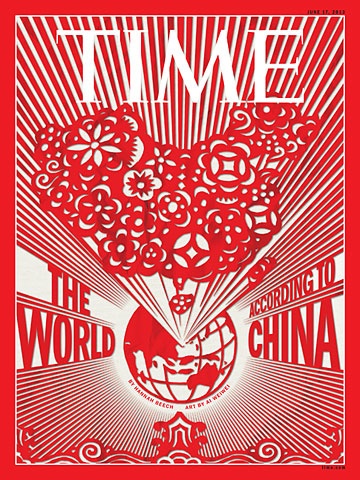
(2 of 7)
For decades, China's outlook on how East met West was simple: a proud, ancient civilization was brought to its knees by foreign gunboats, British opium and Japanese wartime oppression. Whenever the People's Republic dealt with the world, it did so with a chip on its shoulder, and Xi's forerunners larded their speeches with accusatory references to "a century of humiliation" at foreign hands. The West was regarded as arrogant overlord, democratic foe and subversive instigator rolled into one. That sense of historic injustice festered even as China's growing economic power might have been expected to sweep away such insecurities. But the ascension of President Xi--he of the patriotic swagger, political pedigree and photogenic PLA-folksinger wife--heralds a new era of China's interaction with the international community. Instead of simply positioning China as a vanquished, aggrieved inferior, Xi and his China Dream envision a mighty nation reclaiming its rightful place in the world, not just economically but politically and culturally too.
To that end, the Xi-Obama confab, which comes at what the Chinese leader calls "a critical juncture" and could, he says, signal "a new type of great-power relationship," is being regarded in China as a meeting of equals. From the Chinese perspective, the Middle Kingdom dominated the globe for all but a few unfortunate centuries. Why shouldn't the 21st century bring a return to the planet's natural state of affairs? "Xi Jinping is the perfect embodiment of the China Dream," says Liu. "He will help China compete with the West and advance to its former glory as the most powerful and civilized country on earth."
China's renaissance is by now a familiar narrative, but the story of its astonishing trajectory bears repeating. A nation that half a century ago counted Albania as one of its few trading partners is now the world's second largest economy--and could eclipse the U.S. as the biggest within five years. The Chinese Communist Party has engineered the fastest and greatest expansion of wealth that any country has ever experienced, lifting 300 million people out of absolute poverty. China's trove of superlatives carries global weight: the country's 83 million overseas travelers are the world's biggest spenders; its banks hold the most foreign-exchange reserves; its factories, power plants and vehicles produce the most greenhouse gases; its consumers rank as the No. 1 buyer of luxury goods--even though China's per capita GDP, calculated on a purchasing-power-parity basis, still rates below those of Cuba, Serbia and Tunisia.
China may well become the world's largest consumer market by 2015. Already it is the largest exporter on the planet and one of the top five sellers of weapons. How China sees the world matters because Chinese aspirations, tastes and fears will shape the lives of billions of people across the globe. Indeed, after a couple of centuries of lying dormant, China--and its worldview--may once again dictate the narrative of our age. Great powers write history, and if Xi's China Dream comes to pass, this century will belong to the nation that millennia ago named itself the Middle Kingdom.
